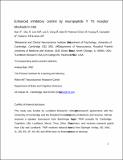Enhanced inhibitory control by neuropeptide Y Y5 receptor blockade in rats
Author(s)
Dec, A.; Lee, J.; Song, D.; Dale, E.; Peterson, J.; Zorn, S.; Huang, X.; Campbell, B.; Lee, A. W.; Robbins, T. W.; West, A. R.; Bari, Andrea; ... Show more Show less
Download213_2014_3730_ReferencePDF.pdf (1.363Mb)
PUBLISHER_POLICY
Publisher Policy
Article is made available in accordance with the publisher's policy and may be subject to US copyright law. Please refer to the publisher's site for terms of use.
Terms of use
Metadata
Show full item recordAbstract
Rationale
The neuropeptide Y (NPY) system acts in synergy with the classic neurotransmitters to regulate a large variety of functions including autonomic, affective, and cognitive processes. Research on the effects of NPY in the central nervous system has focused on food intake control and affective processes, but growing evidence of NPY involvement in attention-deficit/hyperactivity disorder (ADHD) and other psychiatric conditions motivated the present study.
Objectives
We tested the effects of the novel and highly selective NPY Y5 receptor antagonist Lu AE00654 on impulsivity and the underlying cortico-striatal circuitry in rats to further explore the possible involvement of the NPY system in pathologies characterized by inattention and impulsive behavior.
Results
A low dose of Lu AE00654 (0.03 mg/kg) selectively facilitated response inhibition as measured by the stop-signal task, whereas no effects were found at higher doses (0.3 and 3 mg/kg). Systemic administration of Lu AE00654 also enhanced the inhibitory influence of the dorsal frontal cortex on neurons in the caudate-putamen, this fronto-striatal circuitry being implicated in the executive control of behavior. Finally, by locally injecting a Y5 agonist, we observed reciprocal activation between dorsal frontal cortex and caudate-putamen neurons. Importantly, the effects of the Y5 agonist were attenuated by pretreatment with Lu AE00654, confirming the presence of Y5 binding sites modulating functional interactions within frontal-subcortical circuits.
Conclusions
These results suggest that the NPY system modulates inhibitory neurotransmission in brain areas important for impulse control, and may be relevant for the treatment of pathologies such as ADHD and drug abuse.
Date issued
2014-09Department
Picower Institute for Learning and MemoryJournal
Psychopharmacology
Publisher
Springer-Verlag
Citation
Bari, A., A. Dec, A. W. Lee, J. Lee, D. Song, E. Dale, J. Peterson, et al. “Enhanced Inhibitory Control by Neuropeptide Y Y5 Receptor Blockade in Rats.” Psychopharmacology 232, no. 5 (September 7, 2014): 959–973.
Version: Author's final manuscript
ISSN
0033-3158
1432-2072